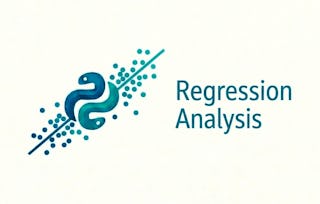This course will help us to evaluate and compare the models we have developed in previous courses. So far we have developed techniques for regression and classification, but how low should the error of a classifier be (for example) before we decide that the classifier is "good enough"? Or how do we decide which of two regression algorithms is better?

Meaningful Predictive Modeling

Meaningful Predictive Modeling
This course is part of Python Data Products for Predictive Analytics Specialization


Instructors: Julian McAuley
6,604 already enrolled
Included with
49 reviews
What you'll learn
Understand the definitions of simple error measures (e.g. MSE, accuracy, precision/recall).
Evaluate the performance of regressors / classifiers using the above measures.
Understand the difference between training/testing performance, and generalizability.
Understand techniques to avoid overfitting and achieve good generalization performance.
Skills you'll gain
Details to know

Add to your LinkedIn profile
See how employees at top companies are mastering in-demand skills

Build your subject-matter expertise
- Learn new concepts from industry experts
- Gain a foundational understanding of a subject or tool
- Develop job-relevant skills with hands-on projects
- Earn a shareable career certificate

There are 4 modules in this course
For this first week, we will go over the syllabus, download all course materials, and get your system up and running for the course. We will also introduce the basics of diagnostics for the results of supervised learning.
What's included
6 videos4 readings3 assignments2 discussion prompts
This week, we will learn how to create a simple bag of words for analysis. We will also cover regularization and why it matters when building a model. Lastly, we will evaluate a model with regularization, focusing on classifiers.
What's included
4 videos4 assignments
This week, we will learn about validation and how to implement it in tandem with training and testing. We will also cover how to implement a regularization pipeline in Python and introduce a few guidelines for best practices.
What's included
4 videos3 assignments
In the final week of this course, you will continue building on the project from the first and second courses of Python Data Products for Predictive Analytics with simple predictive machine learning algorithms. Find a dataset, clean it, and perform basic analyses on the data. Evaluate your model, validate your analyses, and make sure you aren't overfitting the data.
What's included
2 readings1 peer review1 discussion prompt
Earn a career certificate
Add this credential to your LinkedIn profile, resume, or CV. Share it on social media and in your performance review.
Instructors

Offered by
Explore more from Data Analysis
 Status: Preview
Status: Preview Status: Free Trial
Status: Free TrialUniversity of Colorado Boulder
 Status: Free Trial
Status: Free TrialUniversity of Minnesota
 Status: Free Trial
Status: Free TrialUniversity of Colorado System
Why people choose Coursera for their career

Felipe M.

Jennifer J.

Larry W.

Chaitanya A.
Learner reviews
- 5 stars
57.14%
- 4 stars
24.48%
- 3 stars
12.24%
- 2 stars
4.08%
- 1 star
2.04%
Showing 3 of 49
Reviewed on Nov 16, 2019
Excellent content, but presentation is a bit challenging at times.
Reviewed on Mar 31, 2021
The course provided a lot of insights into predictive modeling.

Open new doors with Coursera Plus
Unlimited access to 10,000+ world-class courses, hands-on projects, and job-ready certificate programs - all included in your subscription
Advance your career with an online degree
Earn a degree from world-class universities - 100% online
Join over 3,400 global companies that choose Coursera for Business
Upskill your employees to excel in the digital economy
Frequently asked questions
To access the course materials, assignments and to earn a Certificate, you will need to purchase the Certificate experience when you enroll in a course. You can try a Free Trial instead, or apply for Financial Aid. The course may offer 'Full Course, No Certificate' instead. This option lets you see all course materials, submit required assessments, and get a final grade. This also means that you will not be able to purchase a Certificate experience.
When you enroll in the course, you get access to all of the courses in the Specialization, and you earn a certificate when you complete the work. Your electronic Certificate will be added to your Accomplishments page - from there, you can print your Certificate or add it to your LinkedIn profile.
Yes. In select learning programs, you can apply for financial aid or a scholarship if you can’t afford the enrollment fee. If fin aid or scholarship is available for your learning program selection, you’ll find a link to apply on the description page.
More questions
Financial aid available,
¹ Some assignments in this course are AI-graded. For these assignments, your data will be used in accordance with Coursera's Privacy Notice.

